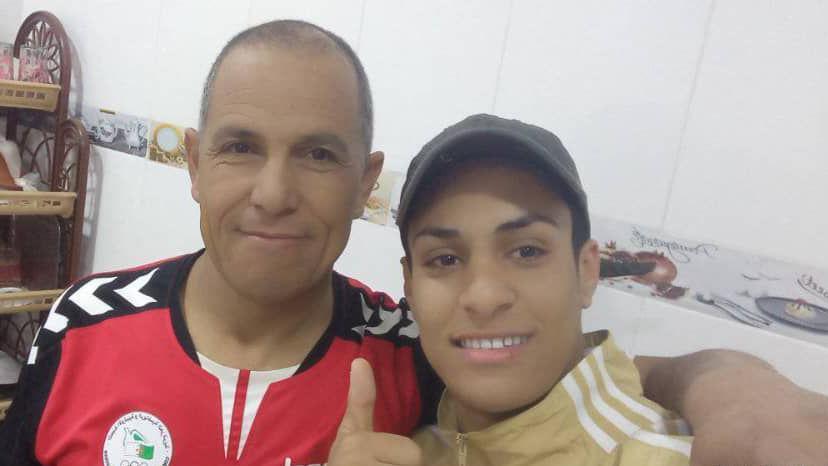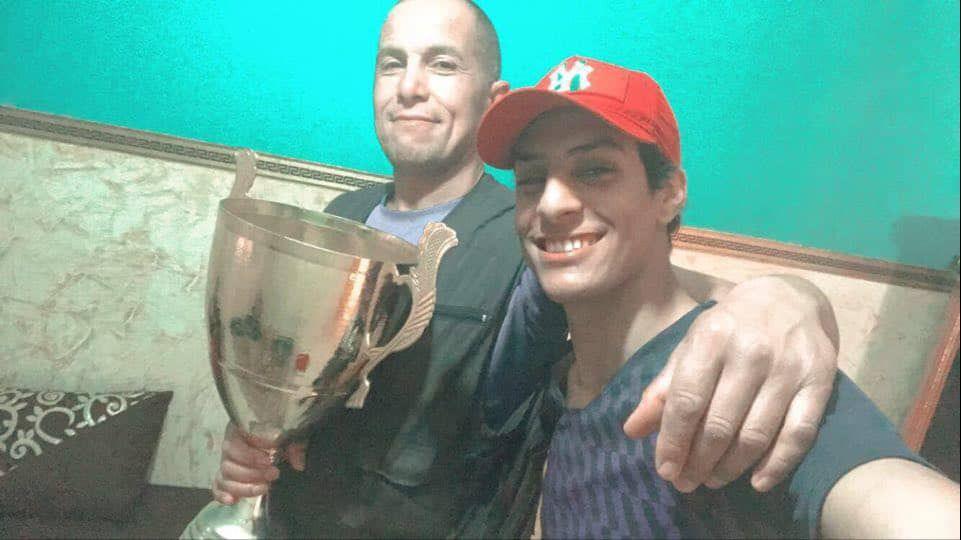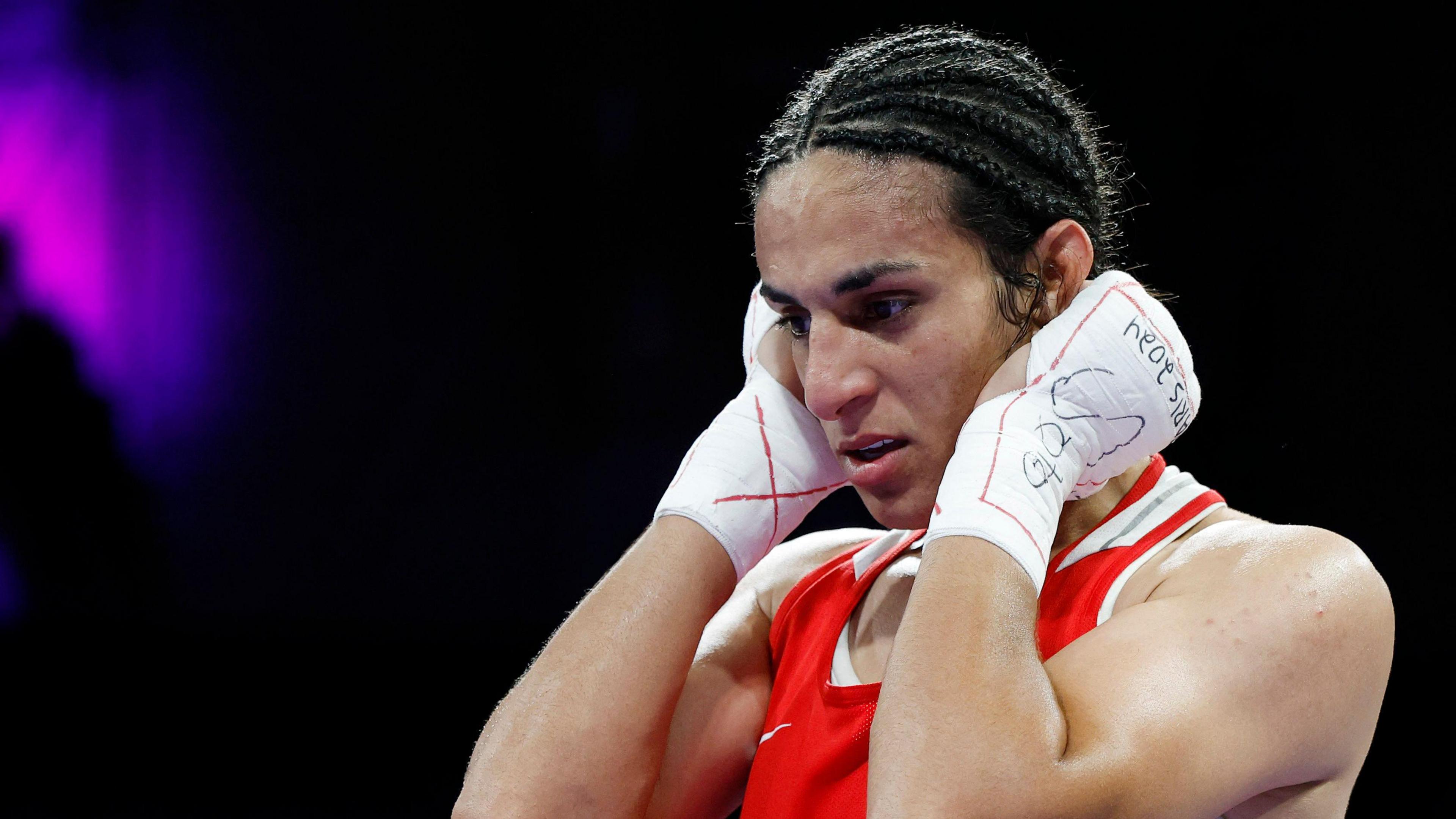Boxer Khelif's uncle describes her tough upbringing

Imane Khelif (right) lived with her uncle Rachid Jabeur (left) whilst training as a boxer
- Published
The family who raised Imane Khelif, the boxer whose Olympics have been overshadowed by a gender eligibility row, has told the BBC "Imane was born female and has lived as a female".
Her uncle, Rachid Jabeur, told BBC Arabic that he thought Khelif’s tough upbringing in Algeria has given her the mental strength to cope with the huge pressure that she has found herself under during the current games.
She is one of two boxers who are competing at Paris 2024 despite being banned from last year's World Championships by the International Boxing Association (IBA), after she was reported to have failed eligibility tests, a situation which has sparked huge controversy.
Imane and Taiwan's Lin Yu-ting have been strongly backed by the International Olympic Committee (IOC), which runs the boxing competitions at the Games, and has ruled that the pair are both women and are eligible to compete.
Rachid, the uncle of Imane, who is guaranteed to win at least a bronze medal in Paris, spoke to the BBC from the city of Tiaret in north-western Algeria.

After years of struggling to pay for training, Khelif is now able to financially support her family
Selling scrap copper
It was only through leaving her remote village to live with her uncle and her aunt that Imane was able to overcome social stigma and forge her career as a boxer.
The eldest of six sisters and one brother, she grew up in Ain Mesbah, a rural village where traditionally only boys would play outside, and girls would rarely leave their homes.
Imane’s sporting talent was discovered by a local boxing coach as she was playing football in the street with boys. The coach invited her to train at a sports centre, about 10km from her home village.
Imane’s father, Amar Khelif, agreed to let her daughter participate in the training. Imane’s mother sold scrap metal and couscous to raise the bus fare for the journey to and from the centre.
Rachid Jabeur told the BBC that it wasn’t long before rumours and gossip began to spread in Imane’s home village. Locals started to question the family’s decision to let her go alone: “Why [would] a girl her age travel without her family?”
This led Imane’s father, a shepherd and a blacksmith, to change his mind and to ask his daughter to stop training with the coach.
Imane was about to give up her sporting aspirations. But then Rachid and his wife contacted Imane’s father to say they would look after her, as they lived closer to the sports centre.
"We welcomed her into our home in the city [Tiaret] where we cared for her with special meals and for sports training,” Rachid said.
“We supported and encouraged her as part of our family."
Like her mother, Imane also would sell scrap copper to cover her training costs but still faced harassment because it was unusual for a girl to take part in boxing, even in a city.
“I always told my sons to accompany her to and from training sessions to protect her,” Rachid said.
Imane’s boxing skills improved rapidly. Three years after moving to live with her uncle, she joined the Algerian national team and competed at the 2018 women’s World Championships, where she came 17th after being eliminated in the first round.

Imane Khelif has faced huge media scrutiny at the Paris 2024 Olympics
Trying to overcome bullying
A year later, her boxing career allowed her to start supporting her family financially, as well as charities in her home village.
Rachid said that he believes Imane's tough upbringing has given her the strength to cope with the controversy that has surrounded her at the Olympics.
“She is always trying to overcome this bullying, and there are people around her who support her.”
“She does not believe in defeat and does not care about these rumours.”
Rachid has advised her to avoid her mobile phone and social media during the controversy.
Imane will meet Janjaem Suwannapheng, who beat favourite Busenaz Surmeneli - the 2020 Olympic champion from Turkey - in the welterweight semi-final on Tuesday 6 August.
Even if she loses, she will leave Paris with a bronze medal.
Boxing at the Olympics is being run by the IOC which has insisted both Imane and Taiwan's Lin Yu-ting are eligible to compete in the women's competition.
IOC president Thomas Bach has said there was "never any doubt" the pair are women.
Imane reached the final of last year's World Championships before being disqualified by the IBA - which was suspended by the IOC in 2019 because of concerns over its finances, governance, ethics, refereeing and judging.
The IBA said Imane had "failed to meet the eligibility criteria for participating in the women's competition, as set and laid out" in its regulations, while the IOC said the pair had been "suddenly disqualified without any due process".